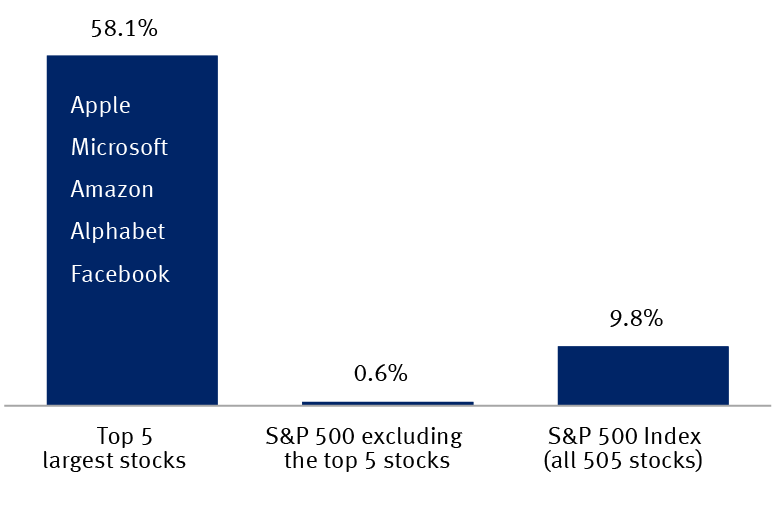How do these things help? I've read a bit about them and they represents the average of all the net advances that happen with all stocks, but I still don't understand how to use them to my advantage. (If more clarification is needed, please comment) I'm still pretty new to investing and have made only a little bit so there's still a lot for me to learn and earn!
-
1Your question is confusing. "they represents the average of all the net advances that happen with all stocks" is just wrong, although there's a small kernel of truth.– RonJohnCommented Jul 26, 2021 at 3:40
-
2HINT: ask questions instead of asserting what you think you know.– RonJohnCommented Jul 26, 2021 at 3:40
2 Answers
Here is a question in turn: Why do you think that the DJIA/S&P500/other indexes should be important to you? Why do you think they could be used to an advantage?
They are reported on by the news to give an overall feel of the market. Currently the S&P500 is up .02%, MARA up over 14% and TAL down 5%. (MARA and TAL are companies).
The S&P500 gives you an idea of what the market is doing currently (in todays example "not much"), but individual stocks can give a very different story.
The first step is understanding what kind of investor you want to be. For some, we work at a career and put excess earnings into the market with a long time horizon. Others do either short or long term trades in an effort to predict market fluctuations. What is your risk tolerance? What are your goals?
You question is akin to someone asking "how can I get better using this hockey stick?" when their sport of choice might be crew or badminton.
Indices are used to assess how the total market is doing, but you can also trade them easily by buying and selling ETFs that track the S&P 500 ($SPY), Nasdaq ($QQQ), and Dow Jones Industrial Avg ($DIA). Many people purely trade in the form of index because:
- they're risk-averse,
- desire slow but reliable growth, or
- simply want to preserve already-established wealth.
Other people try to "beat the market" by exchanging individual stocks that they view as likely to outperform. Many newer blindly try whatever is trending, but the more experienced or professional traders focus on maximum possible drawdown and risk/reward ratios, using the index as a basis comparison.
Another way to describe the differences between index and individual stock picking is that by and large half of stocks are more volatile than the other half, and thus the index is a compromise between potential gain and risk or volatility. S&P 500 is the reference beta of 1, and hundreds of stocks have a higher beta w.r.t. S&P. Investors often don't like the uncertainty that comes with highly-volatile stocks, and prefer an index. Capital appreciation will be limited more, but risk goes down and the rapid swings of volatility decrease as well.
The same can be said about the Russell 3000 as an index, which is an interesting case study due to the fact that it collectively accounts for about 98% of available U.S. publicly-traded securities. It provides a massive cumulation of historical data on stocks. Assessment of the data leads to interesting conclusions. The vast majority of gains are attributable to a small minority of companies:
"For every Google (GOOG) or Apple (AAPL), there are hundreds of below average performers. Consider the following. For the period 1983-2008, the Russell 3000 (which represents about 98 percent of the investable market) returned almost 10 percent a year, producing a total return of 1,074 percent! During this period, about 40 percent of stocks had a negative return and about 20 percent of stocks lost nearly all of their value. Sixty-four percent of all the stocks underperformed the Russell 3000. Clearly a small number of stocks are responsible for a majority of the gains -- about 10 percent of stocks recorded huge wins in excess of 500 percent."[1]
This is true for the S&P as well:[2]
If a trader chooses the right stocks then they'll end ahead. But if you pick out of a basket randomly, the probability of beating the market is low. This is why in-depth computation and risk management are seen as so imperative. Investors need to know what exactly they're buying in order to enhance their probability of success and optimize their portfolio.
-
-
1I did not vote this down. It seems to me, the OP doesn’t understand fully what an index is or why people are interested in stock market indices. You gave a very insightful, compelling answer to what feels like a slightly different question, more along the lines of “why should I invest in an index fund“? My initial inclination was to close the question as needing more details, but I think the comments invite the same result. Leaving it open for now, but I hope the OP clarifies. Commented Jul 26, 2021 at 13:53
-
1@FluffyFlareon I also did not downvote. It is important to understand that some people are just cranky and will not explain themselves.– Pete B.Commented Jul 26, 2021 at 14:38

